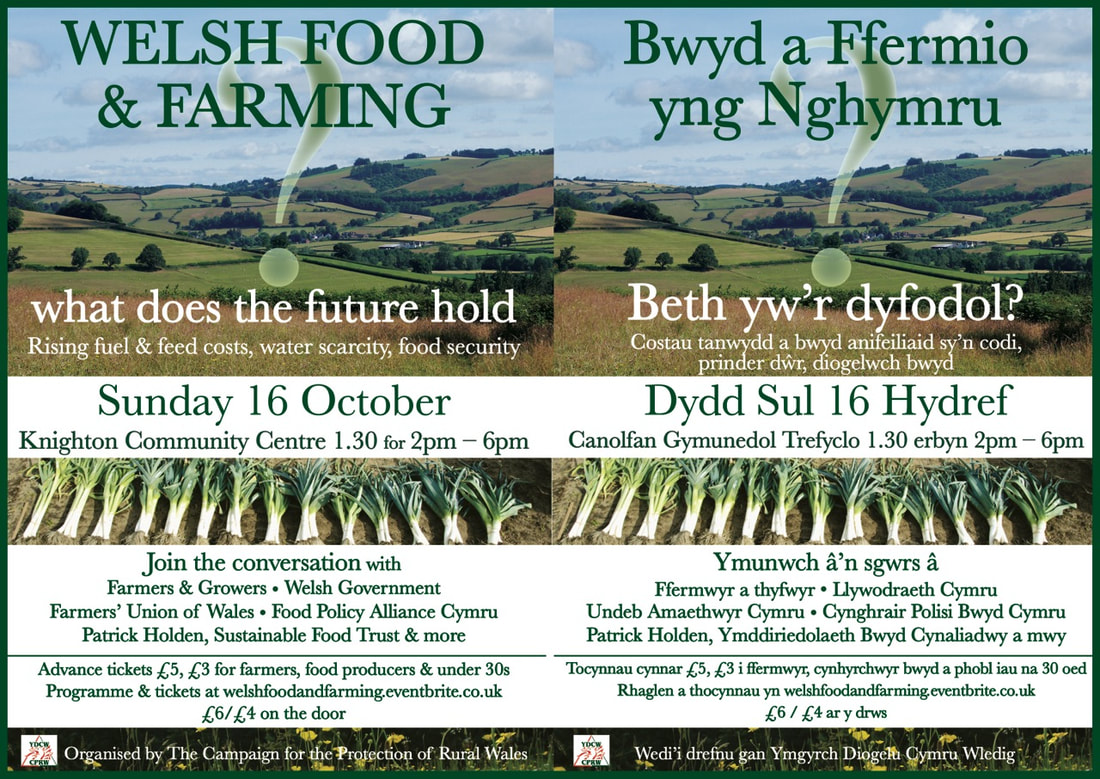|
The Campaign for the Protection of Rural Wales invites you to join expert panelists to explore the challenges we face as Wales moves towards a more sustainable and resilient food and farming system that works with, and for, nature.
Sunday October 16 at Knighton Community Centre, Bowling Green Lane (1.30pm doors open; 2pm start; 6pm finish). The afternoon will take the form of a series of panel discussions - involving farmers/growers as well as policy makers and campaigning groups - with plenty of opportunity to ask questions. Panellists include Patrick Holden from the Sustainable Food Trust, Welsh Government on their Sustainable Farming Scheme and Peter Fox MS on his new Food Bill for Wales. Tickets are £5 or £3 for concessions (farmers/food producers/under 30s) in advance £6 and £4 on the door: welshfoodandfarming.eventbrite.co.uk Come along to hear from our farmers and growers about the changes they are making in the face of rising commodity prices and the climate emergency. What does sustainability mean in practice? And how can policy-makers and consumers support them as we make the transition towards a more sustainable food production system? Also, importantly, how can we ensure that high-quality food is affordable? Tickets are also available on the door – £6 and £4 for concessions. There is plenty of parking at the venue.
0 Comments
Sustainable Food Knighton (SFK) has not been idle during 2022. The group has been working on a new initiative, as part of the general campaign for a more sustainable, fair and healthy food production system in Wales.
SFK originally came together to oppose a local planning application for an IPU (Intensive Poultry Unit) on the edge of Knighton, in Powys. As you will be aware, after a long campaign, including a successful Judicial Review of the original application, Powys Country approved a revised planning application. Looking to the future, the group has decided that we now need to focus on engaging with members of the Senedd and Welsh government, as trying to fight local IPUs, case by case, is costly, exhausting, and potentially divisive in a small community. But other small and under resourced groups continue to wage local campaigns opposing new applications out of desperation; they feel, like us, that no-one is listening to their concerns. We consider all intensive farming to be in contravention of the Welsh government’s own laws on increasing biodiversity and taking action on climate change, and the Well-being of Future Generations Act. We feel the need for a broader campaign to localise Welsh food production that ensures healthy, nutritious food is affordable for all, and provides adequate livelihoods for the growers and farmers. We have focused on three main points which we would like to pursue with the Welsh government and Senedd, and that we would like to be included in policy decisions. 1. A ban on the use of imported soya in Welsh animal feed. The provision of Welsh Government support for farmers to produce appropriate local feed, or adopt methods of animal husbandry that do not rely on additional feed. By using imported soya, Welsh farmers are inadvertently contributing to deforestation and community displacement in South America. Reducing travel miles and becoming more self-reliant will also reduce our carbon footprint. 2. A halt to the inappropriate selling of farmland for afforestation projects. An end to all incentives and support for the growing of crops for biofuels. Provision of assistance and support to farmers to pursue models of mixed farming and make regenerative farming the norm. Support for organic horticulturalists providing local fresh fruit and vegetables. Farmers are being pressurised to sell off their land to large companies seeking to profit from the notorious trade in carbon offsetting - a false solution to climate change. Growing biofuels is a misuse of land needed for food production. Small mixed farms, woodland pasture where animals can graze in between trees, mob grazing, and nature-friendly practices should all be supported. More land should be used to grow fruit, nuts and vegetables for direct human consumption and to improve biodiversity. 3. An immediate moratorium on all new IPUs. Until the government declares a moratorium, it will be impossible to establish how much the contamination of local rivers and shocking decline of biodiversity is caused by nitrates and phosphates resulting from intensive chicken production. In order to find out why, a moratorium must be declared as a matter of urgency so that appropriate action can be taken. We plan to visit the Senedd in the new year to engage directly with MSs (Members of Senedd), and also be a colourful outdoor presence, raising awareness of the need to hold the government to account on its promises to de-intensify farming and support farmers and food producers to adopt regenerative practices while producing healthy, affordable food. We could have short talks or workshops, and maybe a mini People’s Assembly. With this in mind, we would like to engage with as many different groups and individuals as possible who share our aims and concerns and are opposed to industrial farming. Links have, for example, already been established with such groups as Nature Friendly Farming Network, Size of Wales and Our Food. We feel that the more diverse the gathering at the Senedd, the more effective it will be in challenging the government to take real action rather than just making bland statements. Supporters are asked to let us know if you would like to be part of this, even if you would not be able to come to the Senedd but have useful advice or contacts, or would be interested in other ways of re-modelling food production for the 21st century. |


 RSS Feed
RSS Feed
